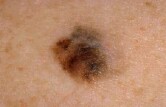Sex, serum lactate dehydrogenase level, BRAF genotype independently associated with survival
MONDAY, Aug. 3, 2015 (HealthDay News) — For patients with metastatic melanoma treated with mitogen-activated protein kinase (MAPK) inhibitors, gender, serum lactate dehydrogenase (LDH), BRAF genotype, and primary melanoma ulceration status are independent factors associated with treatment outcomes, according to research published online July 28 in Cancer.
Alexander M. Menzies, M.B.B.S., from the Melanoma Institute Australia in Sydney, and colleagues correlated clinicopathologic factors with response to MAPK inhibitors and survival for 142 immunotherapy- and MAPK inhibitor-naive patients with BRAF-mutant metastatic melanoma who were treated with BRAF inhibitors (111 patients) or a combination of dabrafenib and trametinib (31 patients). Patients were followed for a median of 15.7 months.
The researchers found that the overall survival (OS) rates at two, three, and four years were 43, 24, and 24 percent, respectively. Female sex and a normal pretreatment serum LDH level were the only clinicopathologic factors associated with longer progression-free survival (PFS) and OS. There were independent correlations for BRAF V600E genotype and an absence of primary melanoma ulceration with longer PFS, but not OS. For patients with normal LDH levels the median OS was 23.5 months, compared with 7.3 months for those with increased LDH levels (hazard ratio, 0.31; P < 0.001). The best survival was seen for complete responders, although two of seven patients still had disease progression.
“Long-term survival occurs for a minority of patients receiving MAPK inhibitor treatment alone,” the authors write. “Patients with a complete response to treatment have the best survival, but relapses still occur.”
Several authors disclosed financial ties to the pharmaceutical industry.
Copyright © 2015 HealthDay. All rights reserved.








